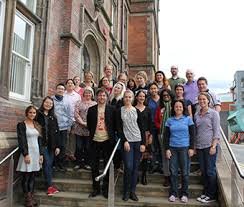
Music Psychology Academic: Dr Renee Timmers
An interview with Dr Renee Timmers
Since 2009, I am a Lecturer, now Senior Lecturer, in Psychology of Music in Sheffield. I teach psychology related modules at UG and PG level including music perception and psychology of performance, and direct the distance learning MAs Music Psychology in Education and Psychology for Musicians.
With Prof. Dibben, I established the research centre “Music Mind Machine in Sheffield” to promote collaboration and exchange across faculties and disciplines between people with shared interests in cognition and music.
I am committed to establish an active research-led teaching and learning community, where students of different levels can blossom by learning from each other as well as from internal and visiting academics, and by learning through close encounters with successful research.
Life until now
My first degree was in Musicology (MA), which I studied in Amsterdam. Thereafter, I pursued a PhD in Psychology (Social Sciences) at the Radboud University Nijmegen. I was involved in collaborative research combining perspectives and methods from psychology, computer science and music theory to investigate perception and cognition of music. My main focus was on (cognitive) rules that underlie the expressive timing of music, but also the freedom that performers have within these rules.
After my PhD, I was a postdoctoral researcher for six years at institutes in Italy (University of Genoa), Austria (OEFAI), the UK (KCL), the Netherlands (Radboud University) and the USA (Northwestern University). I worked at departments of music, psychology and computer science gaining relevant cross-disciplinary experience.
1) When and how did you first discover music psychology?
I heard about a PhD position at the Music, Mind, Machine group in Nijmegen which was open to students with a background in musicology like me. I applied and only got to know what music psychology was really about when doing the PhD. It seemed to suit my interests (music and science) really well!
2) What are your current main areas of focus/study?
I am interested in how other sense-modalities than hearing are involved in music processing. This includes for example spatial representation of pitch and duration, visual representation (i.e. brightness) of intensity and timbre or bodily representations of rhythm. I am investigating the relationship between these cross-modal mappings and emotion perception in music.
Additionally, I am continuing my research on expressive performance of music. An edited volume on “Expressiveness in Music Performance” has just been published as well as a paper on “Synchronisation and leadership in string quartet performance”.
With PG students, I am looking into applications of research including perception of emotion in speech and music in listeners with a cochlear implant.
3) What do you enjoy most about your job?
I like the contact with students and the research. But to be more specific, I like that it is quite entrepreneurial. There are a lot of possibilities and opportunities if one is interested in it. One does have to work for it and organise things, but then there can be all sorts of interesting things (like collaborations with overseas partners, event organisation for particular audiences, collaboration with health organisations).
While working on a beloved subject (music and psychology), one gets a lot of experience with and insight into other domains as well.
4) What is your proudest moment as a music psychology academic?
I really like it that our psychology of music students do so well. We are often pleasantly surprised by what students are submitting for their assignments and what they can realise for their dissertation.
The external examiner of our distance learning program proposed that we should make the dissertations available online (or shortened versions of it), so the outside world has a chance of getting to know their research!
5) What is your favourite music psychology text?
There are lots of very nice and accessible books that have contributed a lot to making psychology of music better known among the general public. Musicophilia from Oliver Sacks for example.
I especially like Music, Thought, and Feeling by William Thompson and Psychology of Music: From Sound to Significance, which gives a great introduction to the field as a whole.
6) What music do you like to listen to and/ or perform in your spare time?
I like early and mid 20th century music to go to concerts to and to play (but less and less within my capabilities). But I end up listening most of the time to the music that my daughter likes, which is fine too. She enjoys the Beatles, Katy Perry, One Republic, and a Dutch singer called Eefje Visser.
7) Do you have any advice for future, budding music psychology students?
Have a go and look for the places to study it (Sheffield, London, Northwestern, Ohio, Jyvaskyla, Amsterdam). It is an interdisciplinary program so helps you to develop a range of skills and learn about social, psychological, developmental and emotional aspects of human beings through the study of music.
The distance learning program ‘Psychology for Musicians’ in Sheffield is a two-year program and takes on students in August of this year (2015). Something to keep in mind!



